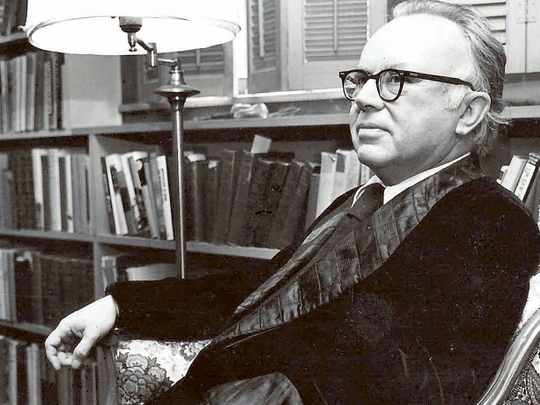
Russell Kirk: American Conservative
by Bradley J. Birzer, University Press of Kentucky, 608 pages, $35
“I’m so happy to find that you’re little, too!” the political philosopher Leo Strauss said when he first met Russell Kirk in Chicago in the mid-1950s. “From your books, I had feared that you might be a great, tall, fierce man.”
Kirk can still seem great and fierce. It was his book “The Conservative Mind” (1953) that first used the word “conservative” to classify various currents of antiprogressive dissidence that ran from the French Revolution to the 20th-century heyday of social democracy. Kirk’s book was an event. After a recommendation from Whittaker Chambers, “Time” magazine devoted the entire book review section to it.
And Kirk had other gifts. He was a capable writer of ghost and fantasy novels. He founded and edited two prestigious journals. Not just Strauss and Chambers but also T.S. Eliot and Ray Bradbury esteemed him. In 1955, Flannery O’Connor, scarcely able to walk, travelled some 550 kilometres in hopes of seeing him lecture in Tennessee.
Yet, by the time he died in 1994 at the age of 75, Kirk did look little. His brand of conservatism had come under attack from some of the people it was meant to inspire, including “neoconservative” foreign policy hawks in Washington and Lincoln-revering disciples of Strauss on the West Coast.
In a diligent and adulatory study of Kirk’s life and thought, the Hillsdale College historian Bradley J. Birzer makes high claims for Kirk as both a man of letters and a philosopher, and makes plain why Kirk worked such a fascination on thinking Americans, even nonconservatives, half a century ago.
Kirk grew up in Plymouth, Michigan, in a family that was bookish but poor. He was solitary and self-dramatising, later even a bit of a dandy, affecting sword canes, capes, three-piece suits with watch fobs and fedoras. He wrote his first autobiography in his mid-30s and often referred to himself in the third person. (When his rival Frank Meyer won a foundation grant, Kirk wrote to William F. Buckley, “There is a concerted effort to denigrate Russell Amos Kirk.”)
He sought out feuds with anyone he suspected of pragmatism, utilitarianism or logical positivism. When the publication of “The Conservative Mind” made it possible for him to resign his junior faculty position at Michigan State, he cast his decision as a protest against the institution’s “progressive lowering of standards”.
The principles Kirk laid out in his books once passed for a generic description of conservatism. Today they look idiosyncratic. “The Conservative Mind” grew out of a doctoral thesis on the intellectual heirs of Edmund Burke that he wrote at St Andrews in Scotland. Kirk was intellectually smitten with Burke, especially with his critical assessment of the French Revolution. He could paraphrase Burke with such subtlety that the reader can almost never tell where Burke leaves off and Kirk picks up.
“The individual is foolish, but the species is wise,” Kirk writes. “Prejudices and prescriptions and presumptions are the instruments which the wisdom of the species employs to safeguard man against his own passions and appetites.” Kirk stressed the religious roots of Burke’s thought, easily documented but until then of interest to relatively few scholars.
“The Conservative Mind” is Manichaean in its certitudes. It elicits passions and loyalties as a sport does. A conservative is one who plays on the Burkean “team”, fights for the same decencies Burke does and denounces the right opponents: the dastardly Jean-Jacques Rousseau, for instance, and Jeremy Bentham, promulgator of “utilitarian” theories that seek “the greatest good for the greatest number”, who is the book’s archfiend. Thus Kirk conscripts the historian Thomas Babington Macaulay, a liberal Whig, into his conservative army, only because Macaulay wrote a rather atypical debunking of Bentham in his youth.
Kirk is preposterously Anglophilic. This disposition is justified by the influence of British thought on the conservative parts of America’s constitutional culture, but it quivers with something more literary and emotional, too. When Kirk writes of Britain’s tragic inability to defend “the rural parishes and tight little towns that had nourished English political stability, English literature and English charm”, one hears a note that runs through American literature after Henry James.
“The Conservative Mind” is the work of an American shocked by a first encounter with Europe, and thus with the relative shallowness of his own culture. Perhaps Kirk had a vocation for nostalgia: in his early 20s, he worked at Greenfield Village — Henry Ford’s “living history” theme park — where he did a variety of jobs, including playing the role of old-time preacher.
Kirk’s philosophical conservatism is nothing like the political doctrines that today bear that name: he backed the Socialist Norman Thomas for president in 1944, Barry Goldwater in 1964, Eugene McCarthy in 1976 and Pat Buchanan in 1992. He was not nationalistic. American nuclear strategy, the internment of Japanese citizens during the Second World War, the country’s treatment of American Indians and Middle East policy at the time of the first Gulf war — these outraged him.
Nor does Kirk extol entrepreneurship. He regrets that “Alexander Hamilton the financier, the party manager, the empire builder, fascinates those numerous Americans among whom the acquisitive instinct is confounded with the conservative tendency”. Kirk worried early on about “vanished forests and eroded lands, wasted petroleum and ruthless mining”.
Because Kirk cut such an eccentric path through the Western intellectual tradition, it is no mean scholarly feat to discern an overarching project in his writing. At this Birzer succeeds admirably. He gives mini-biographies of those who influenced Kirk, including the Harvard French scholar Irving Babbitt, the “Nation” editor Paul Elmer More and (in rather too much detail) T.S. Eliot. Birzer traces a favourite Kirkian-Burkean argument — that societies too rationally organised make easy prey for demagogues — to its origins in Plato’s “Republic”.
He shows that the Stoicism Kirk professed in his youth is in profound philosophical harmony with the Catholicism he turned to in the 1960s and that Kirk was not the first intellectual to make the transition from one to the other. He believes Kirk suffered from his forays into politics and from his association with Buckley and “National Review”.
Birzer’s focus is more on Kirk’s thought than on his life. We do not find out why Kirk remained celibate until he married in his mid-40s or how he managed to spend whole summers in Scotland when he was so often strapped for cash. Like Kirk himself (who called Henry Adams “the zenith of American civilisation”, Eric Voegelin “the most influential historian of our century” and Bradbury 20th-century America’s “best prose fiction” writer), Birzer is given to flinging around superlatives. He calls one of the characters in Kirk’s “Lord of the Hollow Dark” “not only a highlight of the novel but also a highlight of 20th-century literature”. He exaggerates Kirk’s importance in the past decades’ revival of interest in Burke and Tocqueville.
Birzer ascribes to Kirk a larger role than the facts warrant in the early stages of Barry Goldwater’s campaign for the 1964 Republican nomination, showing that Kirk wrote two speeches for him in 1962 but giving no account of any conversation the two ever had and citing no Goldwater letters that go beyond political boilerplate. Kirk is too often the book’s hero rather than its subject.
Birzer calls “The Conservative Mind” a “postmodern hagiography”. It is an apt description. Kirk’s mighty intelligence was, in retrospect, that of a curator or anthologist, not that of a creator. To say so is not to demean him. Kirk’s guiding principle was that when the subject is human nature, nothing is ever really created. Institutions, traditions and wisdom are either handed down or, if need be, rediscovered. This remains a deep and necessary insight. “Conservatism” is as good a name for it as any.
–New York Times News Service
Christopher Caldwell is a senior editor at “The Weekly Standard”.








